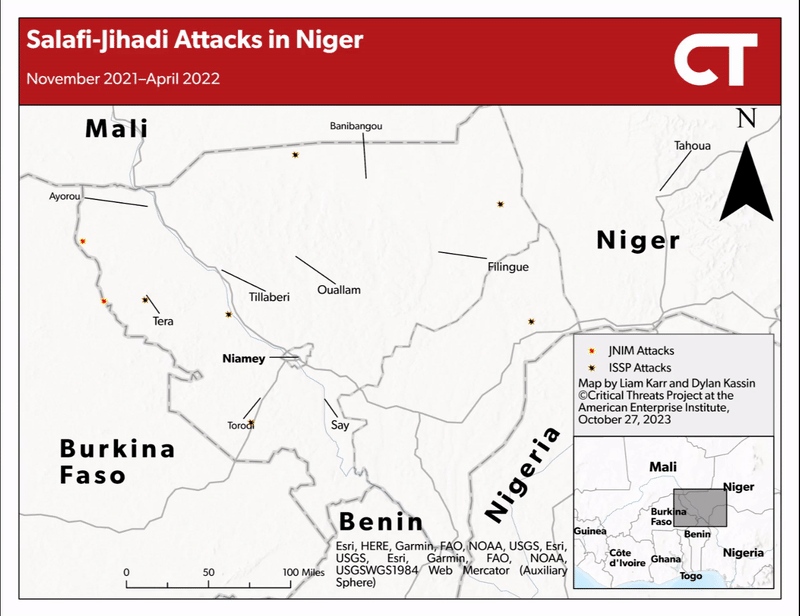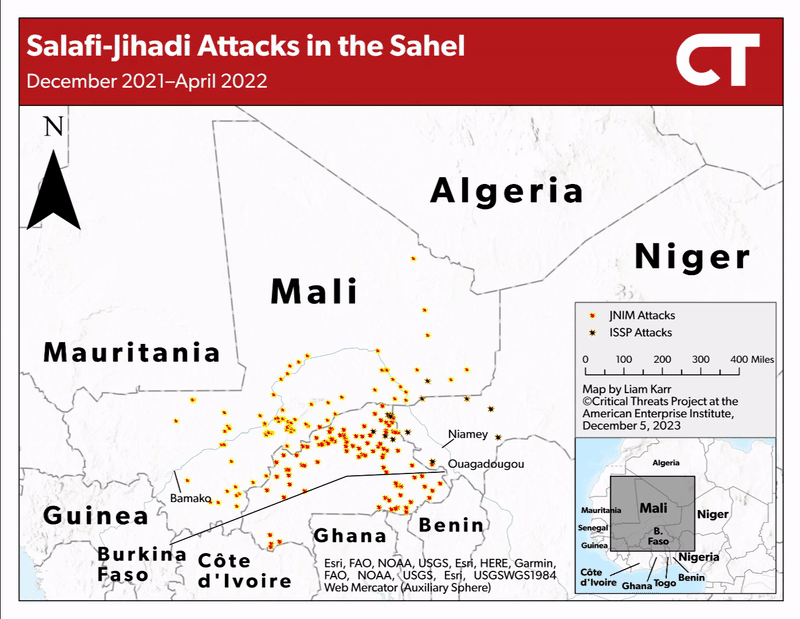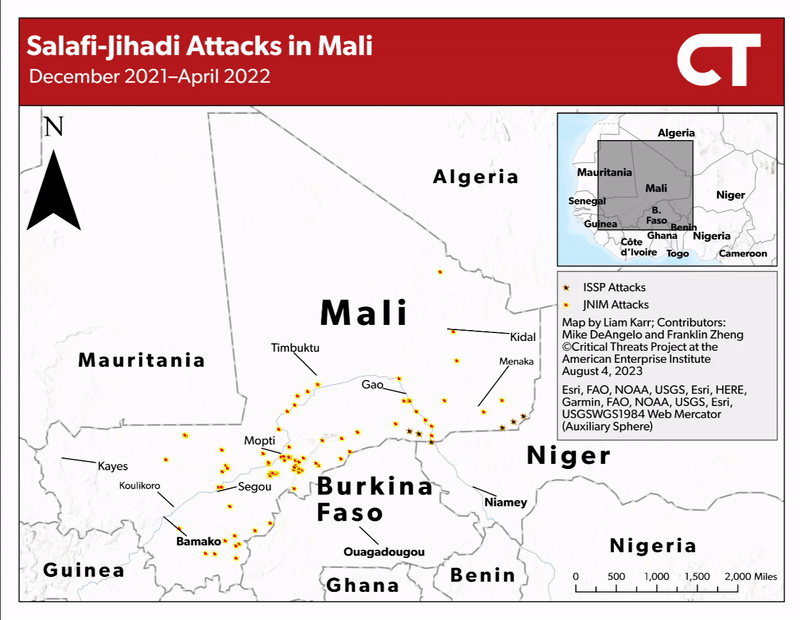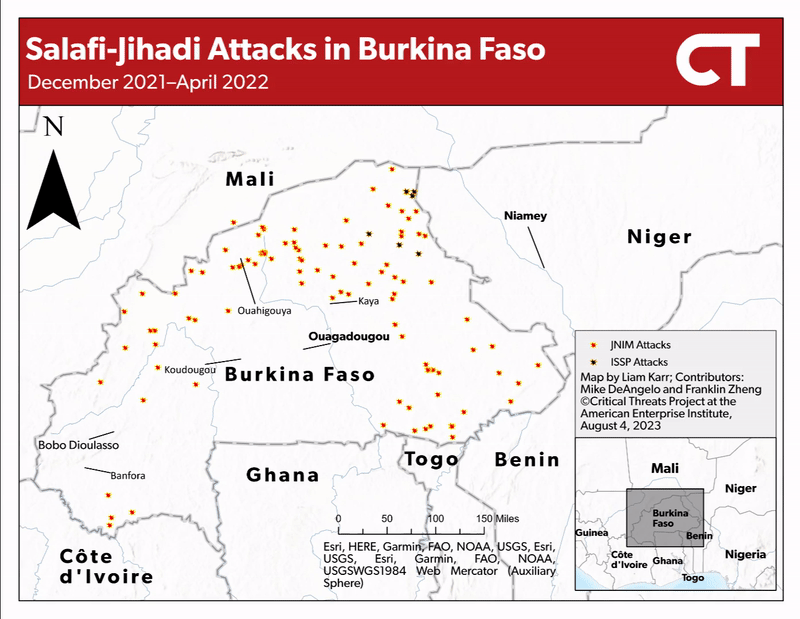SOURCE:
( ) SALAFI-JIHADI MOVEMENT UPDATE SPECIAL EDITION, DECEMBER 7, 2023 : https://www.understandingwar.org/backgrounder/salafi-jihadi-movement-u pdate-special-edition-december-7-2023
Salafi-Jihadi Movement Update Special Edition, December 7, 2023
Western Failures, Military Coups, and Kremlin Gains Undermine US Strategic and Counterterrorism Interests in the Sahel
Western counterterrorism efforts in the Sahel over the past decade have failed, which contributed to governance collapse and the rise of military juntas in Burkina Faso, Mali, and Niger that have exacerbated the regional insurgency.
Western troops have been conducting counterterrorism operations in the Sahel since French troops entered Mali in 2013 to liberate jihadist-controlled cities in northern Mali. French troops remained in Mali until 2022 as part of Operation Barkhane, which aimed to contain the spread of Salafi-jihadi groups and limit their ability to pose transnational threats. Other Western partners provided an array of advisory, logistical, and training support to regional militaries to enable Burkina Faso, Mali, and Niger to improve their own security. The West aimed to contain the Salafi-jihadi groups by killing or capturing Salafi-jihadi cells and building state capacity in each country. However, the Western partners’ strategy failed to protect the local population, address poor governance, and reconcile local political dynamics that drove insecurity. These shortcomings enabled the Salafi-jihadi insurgency to recover in Mali after the initial French military successes in 2013 and spread into Burkina Faso and Niger. The level of violence in all three countries rose every year between 2017 and 2021. Military leaders in all three countries used popular discontent stemming from frustrations with corruption and continued instability to justify five coups between 2020 and 2023.
Author: Liam Karr
Key Takeaway:
Western counterterrorism efforts in the Sahel over the past decade have failed, which contributed to governance collapse and the rise of military juntas in Burkina Faso, Mali, and Niger that have exacerbated the regional insurgency. Russia has taken advantage of this shift to entrench itself in the region, to the benefit of Salafi-jihadi insurgents and at the expense of US geostrategic and counterterrorism interests.
Western counterterrorism efforts in the Sahel over the past decade have failed, which contributed to governance collapse and the rise of military juntas in Burkina Faso, Mali, and Niger that have exacerbated the regional insurgency. Western troops have been conducting counterterrorism operations in the Sahel since French troops entered Mali in 2013 to liberate jihadist-controlled cities in northern Mali.[1] French troops remained in Mali until 2022 as part of Operation Barkhane, which aimed to contain the spread of Salafi-jihadi groups and limit their ability to pose transnational threats. Other Western partners provided an array of advisory, logistical, and training support to regional militaries to enable Burkina Faso, Mali, and Niger to improve their own security.[2] The West aimed to contain the Salafi-jihadi groups by killing or capturing Salafi-jihadi cells and building state capacity in each country. However, the Western partners’ strategy failed to protect the local population, address poor governance, and reconcile local political dynamics that drove insecurity. [3] These shortcomings enabled the Salafi-jihadi insurgency to recover in Mali after the initial French military successes in 2013 and spread into Burkina Faso and Niger. The level of violence in all three countries rose every year between 2017 and 2021.[4] Military leaders in all three countries used popular discontent stemming from frustrations with corruption and continued instability to justify five coups between 2020 and 2023.[5]
The new juntas repudiated the Western counterterrorism approach of containment and state capacity building in favor of more aggressive strategies and partnerships with Russia. The juntas’ undemocratic rise to power put them at odds with most international partners.[6] The juntas linked civilians’ frustration with the West’s failure to weaken the insurgency and the West’s subsequent postcoup punitive measures, playing off of anti-French and anti-Western sentiment to rally popular support for their newly established regimes.[7] The juntas accused international forces of cooperating with terrorists, imprisoned UN peacekeepers, regularly denied overflight requests, and ultimately forced international forces to leave.[8] These actions fractured the juntas’ relationships with most international partners and contributed to the end of nearly all counterterrorism support the West had provided.[9] France withdrew from Mali in 2022 and Burkina Faso and Niger in 2023, and UN forces will leave Mali by the end of 2023.[10] Niger also ended security and defense partnerships with the EU in December 2023 and, with Burkina Faso, left the EU, UN, and African Union–funded Sahel G5 Joint Force that aimed to enhance regional counterterrorism coordination.[11]
The juntas have looked to Russia to fill the resulting void because Russia offers a more attractive partnership that addresses their broader needs for regime security and aligns with their anti-Western and militaristic outlooks. The juntas argue that Russia has given them greater access to the military hardware they needed to defeat the insurgency, including auxiliary forces such as the Kremlin-funded Wagner Group in Mali.[12] The juntas also view Russia as a regime security provider. The Burkinabe and Nigerien juntas sought Russian mercenaries to help defend against immediate threats to their power—a coup and regional military intervention, respectively—indicating an expectation that Russian forces provide regime security.[13]
The juntas’ disregard for civilian casualties and the reduction of international support have worsened the regional insurgency. The juntas’ strategies have exacerbated the insurgency by amplifying human rights abuses through indiscriminate violence and collective punishment tactics that the insurgents use as a recruiting tool.[14] The strategies have simultaneously failed to address the underlying issues that the Western approach did not resolve.
Each junta has sought auxiliary forces that are prone to human rights abuses to improve their military capacity. The Malian junta’s move to contract the Wagner Group in September 2021 has emboldened Malian soldiers to perpetuate indiscriminate violence against civilians and amplified security force abuses against civilians.[15] The Nigerien junta is pursuing a contract with the Wagner Group or alternative Russian mercenary forces and continues to deepen ties with the Kremlin.[16] The Burkinabe junta has avoided a large Wagner deployment in favor of expanding the role of under-trained Burkinabe civilian auxiliaries who have carried out multiple ethnically-linked human rights abuses.[17] The junta recruited 50,000 such auxiliaries in October 2022 and forcibly recruited civil society dissenters to the civilian force throughout 2023.[18]
Russian assistance in Mali cannot replace the international support the state previously received and has not degraded the insurgency. Wagner has only a 1,000-strong contingent in the country, which cannot replace the 2,400 French and 13,000 UN forces that previously operated there. The Wagner forces and other Russian aid have The Russian assistance has not degraded the insurgency, however. Al Qaeda’s Sahelian affiliate Jama’at Nusrat al Islam wa al Muslimeen (JNIM) and Tuareg rebels are contesting Malian and Wagner forces to fill the vacuum left by departing UN forces in northern Mali. JNIM and Tuareg rebels have also separately claimed to overrun at least eight bases in northern Mali since the beginning of September.[19] JNIM has simultaneously continued to strengthen across central Mali and near the capital in southern Mali, as evidenced by an attack that killed the Malian president’s chief of staff in April 2023.[20] The Islamic State’s Sahel Province (ISSP) has also carved out a governance sphere in northeastern Mali since the French withdrawal and has implemented various economic, health, infrastructure, judicial, and security initiatives across at least five Malian districts.[21]
However, the Russian assistance in Mali has been sufficient to contribute to symbolic victories that improve regime security. Wagner mercenaries and Russian military equipment helped Malian forces capture Kidal town in November 2023, for example.[22] This victory strengthened the junta’s regime security and popular support among its base, as the junta had staked its legitimacy on capturing Kidal and emphasized that recapturing the town from separatist Tuareg rebels for the first time since 2012 was a matter of national sovereignty.[23]
The reduction in domestic and international focus on counter terrorism pressure in Niger after the July 2023 coup has enabled ISSP to increase the rate, scope, and severity of its attacks in Niger. The junta has given priority to protecting itself from a potential regional intervention to restore the Nigerien president and concentrated its forces around the capital to maintain control.[24] This has drawn forces away from the border and created gaps for Salafi-jihadi militants to exploit.[25] The withdrawal of French support and halting of US military cooperation after the July 2023 coup has made Nigerien forces even more vulnerable to Salafi-jihadi attacks.[26] ISSP has nearly tripled its monthly rate of attacks and carried out several large-scale ambushes that killed hundreds of Nigerien troops in October and November.[27] Local reports on X (Twitter) claim that ISSP has begun collecting zakat—an obligatory religious tax in Islamic law that Salafi-jihadi groups use to mask forcible extortion—in localities closer to the Nigerien capital since the July coup.[28]
Salafi-jihadi groups are exploiting all three countries’ ineffective strategies to consolidate control over their support zones and expand toward political and economic centers (Figures 1–4).
Figure 1. Salafi-Jihadi Attacks in the Sahel
Source: Liam Karr.
Figure 2. Salafi-Jihadi Attacks in Mali
Source: Liam Karr.
Figure 3. Salafi-Jihadi Attacks in Burkina Faso
Source: Liam Karr.
Figure 4. Salafi-Jihadi Attacks in Niger
 Source: Liam Karr and Dylan Kassin.
Source: Liam Karr and Dylan Kassin.
Russian partnerships with the juntas support the Kremlin’s strategic efforts to evade Western sanctions and undermine Western influence in global institutions. Russia uses its partnerships with African countries to gain access to valuable natural resource deposits—such as gold, oil, and chromite—that allow Russia to mitigate the effect of Western sanctions in response to its invasion of Ukraine.[29] Burkina Faso and Mali both have large gold deposits, though Russia has not yet managed to expand their gold production outside of already sanctioned Russian entities.[30] US intelligence officials also said that the Wagner Group used the Malian junta as a middleman to circumvent sanctions and acquire weapons for Russian fighters in Ukraine.[31] Russia further uses its partnerships with African countries to advance its strategic goals of countering Western influence in global institutions, such as the UN, and reestablish Russia as a global power via weapons sales and other bilateral partnerships.[32]
Continued Russian-backed military rule and aggressive military strategies that disregard civilian lives will almost certainly exacerbate the regional insurgency at the expense of US interests. The Kremlin has stepped up engagement with the Sahelian juntas as part of its effort to replace the Wagner Group after the July 2023 Wagner rebellion and the death of the group’s former leader, Yevgeny Prigozhin, in August 2023.[33] The Russian deputy minister of defense visited the three juntas in September and December 2023.[34] Open-source intelligence organizations have assessed that the Russian Ministry of Defense (MOD) is ramping up recruitment for a new private military company called “Africa Corps” that aims to establish a foothold in Burkina Faso and Niger and subsume preexisting Wagner operations in other countries such as Libya and Mali.[35] Russian milbloggers have noted that MOD private military companies and their leadership would not have the same local connections or understanding that the Wagner Group has developed since arriving in Mali in 2021.[36] This lack of local understanding increases the risk that an MOD force would initially be even less effective than Wagner. The rivalry between MOD and Wagner would cause further coordination issues as MOD forces began to replace Wagner forces in Mali, which would create additional security gaps. The Kremlin and juntas have also signed several bilateral and multilateral agreements in the second half of 2023, including deals on nuclear energy, gold refineries, and a mutual self-defense pact among the juntas.[37]
Heightened insecurity and Russian influence in the Sahel will threaten European and US strategic interests by increasing migration that could destabilize North Africa and Europe. The EU has repeatedly identified migration as a critical issue after the 2010s Syrian refugee crisis destabilized the continent by overwhelming the EU asylum system and amplifying racial tensions, giving rise to ethno-nationalist right-wing political movements.[38] Increased migration to North Africa risks having a similar impact on fragile North African countries, which would only increase the potential migrant flows across the Mediterranean to Europe.[39]
The Kremlin has recognized this vulnerability and repeatedly fomented and weaponized refugee crises to destabilize Europe and would similarly benefit from a new refugee wave.[40] This threatens the strategic EU-US partnership that is crucial to global trade, the war in Ukraine, US democratic values, and various other US policies. Thousands of migrants use transnational smuggling and trafficking routes that run through Mali and Niger to reach coastal North and West Africa and eventually Europe.[41] The Nigerien junta ended a controversial 2015 EU-supported law as part of its rebuke of Europe in early December 2023 that targeted a major trafficking route through northern Niger to North Africa.[42] Oversimplified migration deals like the 2015 law have failed to address the root causes of migration, but the sudden end of such agreements without alternative policies in place will cause influxes of already growing migrant numbers.[43]
Worsening insecurity in the Sahel will also undermine US regional counter terrorism interests. Stronger Salafi-jihadi insurgencies in Burkina Faso and Niger will amplify pressure on key US counter terrorism and economic partners in littoral West Africa.[44] This risks overwhelming US efforts to insulate Benin, Côte d’Ivoire, Ghana, and Togo from a cross-border insurgency through the Global Fragility Act.[45] Growing Salafi-jihadi control over parts of Burkina Faso, Mali, and Niger will also increase the transnational threat risk by giving IS and al Qaeda militants the resources and space to plot attacks against neighboring African states—or attacks in Europe, should they choose to do so.
References
[1] https://www.airuniversity.af.edu/Portals/10/ASPJ_French/journals_E/Volum...
[2] https://warontherocks.com/2022/02/why-france-failed-in-mali
[3] https://www.crisisgroup.org/africa/sahel/mali/304-transition-au-mali-pre...
[4] https://warontherocks.com/2022/02/why-france-failed-in-mali
[5] https://www.usip.org/publications/2021/12/after-two-coups-mali-needs-reg...
[6] https://x.com/ecowas_cedeao/status/1295858295320842241?s=20; http://pea...
[7] https://www.france24.com/en/video/20221002-burkina-faso-coup-leader-taps...
[8] https://www.reuters.com/world/africa/mali-junta-wiping-its-feet-blood-fr...
[9] https://x.com/ecowas_cedeao/status/1295858295320842241?s=20; http://pea...
[10] https://www.lemonde.fr/en/le-monde-africa/article/2022/08/21/french-with...
[11] https://www.voanews.com/a/burkina-faso-niger-join-mali-in-leaving-g5-ant...
[12] https://apnews.com/article/united-nations-general-assembly-africa-france...
[13] https://www.jeuneafrique.com/1503219/politique/au-burkina-faso-des-milit...
[14] https://www.hrw.org/news/2021/10/22/mali-alleged-disappearances-executio...
[15] https://www.reuters.com/world/africa/exclusive-deal-allowing-russian-mer...
[16] https://www.letemps dot ch/monde/afrique/alors-que-la-pression-monte-sur-la-junte-nigerienne-des-brigades-de-veille-gardent-les-ronds-points-de-niamey; https://apnews.com/article/wagner-russia-coup-niger-military-force-e0e11...
[17] https://jamestown.org/program/mass-civilian-defense-force-recruitment-ra...
[18] https://jamestown.org/program/mass-civilian-defense-force-recruitment-ra...
[19] Author’s database of significant activity (SIGACT). Available by request. https://www.criticalthreats.org/analysis/salafi-jihadi-movement-weekly-u...
[20] Author’s database of SIGACTs; https://www.criticalthreats.org/analysis/salafi-jihadi-movement-weekly-u...
[21] https://afriquexxi dot info/Dans-le-nord-est-du-Mali-l-Etat-islamique-en-voie-de-normalisation; https://www.criticalthreats.org/analysis/salafi-jihadi-movement-update-s...
[22] https://www.reuters.com/world/africa/malis-army-claims-capture-rebel-str...
[23] https://www.france24.com/en/africa/20231002-mali-redeploys-troops-to-nor...
[24] https://x.com/almouslime/status/1709017368075067449?s=20
[25] https://x.com/almouslime/status/1709017368075067449?s=20
[26] https://www.france24.com/en/live-news/20231005-%F0%9F%94%B4-french-army-...
[27] https://www.bbc.com/news/world-africa-66991696; https://x.com/Wamaps_ne...
[28] https://x.com/ighazer/status/1723313110310617247?s=20
[29] https://thesoufancenter.org/intelbrief-2022-may-2; https://time.com/616...
[30] https://www.reuters.com/article/ukraine-crisis-russia-nordgold/ceo-of-sa...
[31] https://www.lemonde.fr/en/united-states/article/2023/05/27/us-says-russi...
[32] https://www.understandingwar.org/sites/default/files/ISW%20-%20The%20Kre...
[33] https://www.criticalthreats.org/analysis/salafi-jihadi-movement-update-s...
[34] https://www.understandingwar.org/backgrounder/russian-offensive-campaign...
[35] https://alleyesonwagner.org/2023/12/04/opa-russe-sur-le-burkina; https:...
[36] https://t.me/multi_XAM/712
[37] https://www.reuters.com/world/africa/mali-niger-burkina-faso-sign-sahel-...
[38] https://www.politico.eu/article/climate-refugee-crisis-europe-policy; h...
[39] https://www.atlanticcouncil.org/in-depth-research-reports/report/irregul...
[40] https://apnews.com/article/finland-russia-migrants-border-nato-eu-0e1ba6...
[41] https://www.csis.org/analysis/peril-desert-irregular-migration-through-s...
[42] https://www.reuters.com/world/africa/niger-junta-repeals-law-aimed-slowi...
[43] https://www.france24.com/en/africa/20231204-niger-s-repeal-of-migrant-sm...
[44] https://www.hudson.org/security-alliances/niger-coup-west-african-disast...
[45] https://www.hudson.org/security-alliances/niger-coup-west-african-disast...



No comments:
Post a Comment